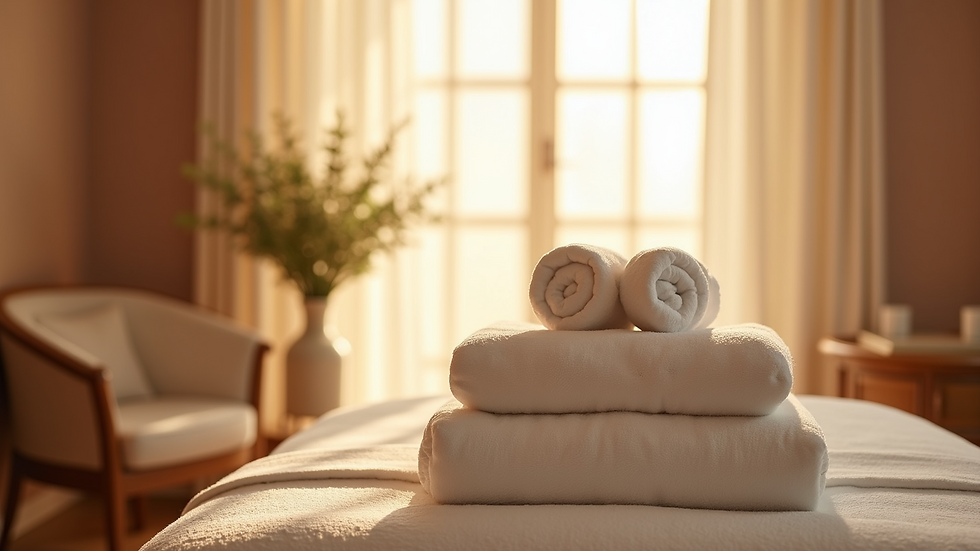Why Lymphatic Drainage Massage Boosts Health
- Victoria aviva Kseniya
- Sep 15, 2025
- 3 min read
The human body has an incredible system designed to protect and cleanse itself. One crucial part of this system is the lymphatic system, which plays a vital role in maintaining overall health. When this system is functioning well, it helps remove toxins, supports immune function, and reduces swelling. However, sometimes the lymphatic flow can become sluggish or blocked, leading to discomfort and health issues. This is where lymphatic massage comes into play as a natural and effective way to boost your health.
Understanding the Benefits of Lymphatic Massage
Lymphatic massage is a gentle, rhythmic technique that encourages the movement of lymph fluids around the body. This helps to clear out waste products and toxins from the tissues, improving circulation and immune response. Here are some key benefits:
Detoxification: By stimulating lymph flow, the body can more efficiently remove harmful substances.
Reduced Swelling and Inflammation: This massage helps reduce fluid retention and swelling, especially after surgery or injury.
Improved Immune Function: A healthy lymphatic system supports the body’s ability to fight infections.
Enhanced Skin Health: Increased circulation can lead to clearer, more radiant skin.
Relaxation and Stress Relief: The gentle massage promotes relaxation and reduces stress levels.
Many people report feeling lighter and more energized after a session. It is especially beneficial for those with chronic conditions like lymphedema, fibromyalgia, or autoimmune diseases.

How Does Lymphatic Massage Work?
The lymphatic system consists of a network of vessels and nodes that transport lymph fluid throughout the body. Unlike the circulatory system, the lymphatic system does not have a central pump like the heart. Instead, it relies on muscle movement, breathing, and external pressure to move lymph fluid.
Lymphatic massage uses light pressure and specific movements to stimulate the lymph vessels. This encourages the fluid to flow toward the lymph nodes, where toxins and waste are filtered out. The massage typically follows the natural pathways of the lymphatic system, starting near the neck and moving down toward the limbs.
The technique is very different from traditional deep tissue massage. It is slow, gentle, and repetitive, designed to avoid compressing the vessels and instead promote fluid movement.

How do I drain my lymphatic myself?
You can perform simple lymphatic drainage techniques at home to support your health between professional sessions. Here are some practical steps:
Dry Brushing: Use a natural bristle brush to gently brush your skin in the direction of lymph flow, usually toward the heart. This stimulates the skin and lymph vessels.
Deep Breathing: Practice slow, deep breaths to help move lymph fluid through the thoracic duct.
Gentle Massage: Use your fingertips to lightly massage areas such as the neck, underarms, and groin in circular motions.
Stay Hydrated: Drinking plenty of water helps keep lymph fluid moving smoothly.
Exercise: Regular movement, especially activities like walking, yoga, or rebounding on a mini-trampoline, encourages lymph flow.
Remember to be gentle and avoid applying too much pressure. If you have any medical conditions, consult a healthcare professional before starting self-massage.

Who Can Benefit Most from Lymphatic Massage?
Lymphatic massage is suitable for many people, but it is especially helpful for:
Post-surgery patients: To reduce swelling and promote healing.
Individuals with lymphedema: To manage fluid buildup.
People with chronic fatigue or immune issues: To boost energy and immune function.
Those with skin conditions: To improve skin tone and reduce puffiness.
Anyone experiencing stress or tension: For relaxation and mental clarity.
It is important to seek treatment from a trained therapist who understands the lymphatic system and can tailor the massage to your needs.
Tips for Choosing a Lymphatic Massage Therapist
When looking for a professional, consider the following:
Certification and Training: Ensure the therapist is certified in manual lymphatic drainage techniques.
Experience: Ask about their experience with your specific health concerns.
Reviews and Recommendations: Look for positive feedback from previous clients.
Comfort and Communication: Choose someone you feel comfortable with and who listens to your needs.
A skilled therapist can make a significant difference in your treatment outcomes.
Final Thoughts on Enhancing Your Well-being
Incorporating lymphatic massage into your wellness routine can have profound effects on your health. Whether you seek relief from swelling, want to boost your immune system, or simply enjoy the calming benefits, this gentle therapy offers a natural solution.
For those interested in exploring this further, consider booking a session with a professional who specializes in lymphatic drainage massage. With consistent care and attention, you can support your body's natural detoxification processes and enjoy improved vitality.
Start your journey toward better health today by embracing the power of lymphatic massage. Your body will thank you for it.
.webp)



Comments